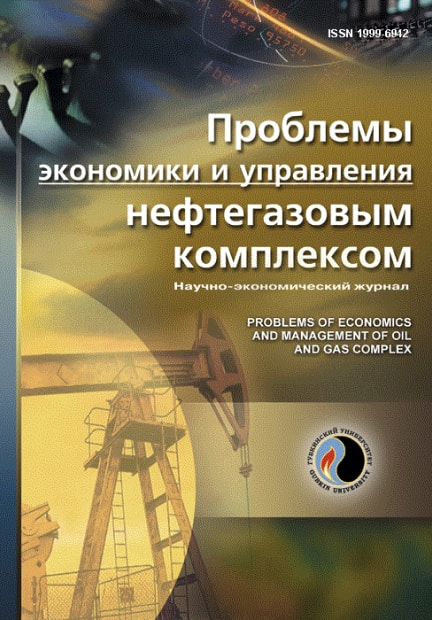Scientific and economic journal
«Problems of economics and management of oil and gas complex»
ISSN 1999-6942

Russia’s role in the emerging landscape of the geopolitics of hydrogen
UDC: 327.8
DOI: -
Authors:
1 National Research University Higher School of Economics, Moscow, Russia
Keywords: global energy transition, decarbonization, hydrogen geopolitics, climate security, renewable energy, "blue" and "green" hydrogen, carbon capture, utilization and storage, low-carbon geopolitics of hydrogen
Annotation:
Global decarbonization efforts are one of the key trends influencing the current global energy politics. The key direction within their framework is the replacement of traditional energy sources and carriers by alternative, less carbon-intensive ones, with hydrogen being one of the most important among them. The development of hydrogen energy can significantly transform the position of individual countries and even regions on the world map in terms of geopolitics. The key factors determining a country's position within the framework of hydrogen geopolitics are: availability of natural gas and/or high technical potential of renewable energy, availability of significant fresh water reserves as well as the development of infrastructure for hydrogen production, storage and transportation. Russia is one of the leading countries in terms of all factors except for technological ones. By developing domestic technological potential of hydrogen energy, Russia will be able to derive significant geoeconomic advantages and strengthen its technological sovereignty, which is currently a national priority.
Bibliography:
1. Climate Change 2022: Mitigation of Climate Change / R. Slade, R. Fradera, M. Pathak [et al.]; edited by P.R. Shukla, J. Skea. – Intergovernmental Panel on Climate Change, 2022. – URL: https://www.ipcc.ch/report/ar6/wg3/downloads/report/IPCC_AR6_WGIII_FullReport.pdf (data obrashcheniya 08.12.2023).2. Shuranova A.A., Chistikov M.N. Mesto klimaticheskoy bezopasnosti v strategicheskom planirovanii: keys Rossii i Norvegii // Analiz i prognoz. Zhurn. IMEMO RAN. – 2023. – № 2. – S. 24–42. – DOI: 10.20542/afij-2023-2-24-42
3. The new oil? The geopolitics and international governance of hydrogen / T. Van de Graaf, I. Overland, D.J. Scholten, K. Westphal // Energy Research & Social Science. – 2020. – Vol. 70. – P. 101667. – DOI: 10.1016/j.erss.2020.101667
4. Portanskiy A.P. Klimaticheskaya povestka i protivorechiya mezhdu uchastnikami mirovoy torgovli // Problemy ekonomiki i upravleniya neftegazovym kompleksom. – 2023. – № 3(219). – S. 25–29. – DOI: 10.33285/1999-6942-2023-3(219)-25-29
5. Palle A. Bringing geopolitics to energy transition research // Energy Research & Social Science. – 2021. – Vol. 81. – P. 102233. – DOI: 10.1016/j.erss.2021.102233
6. Vakulchuk R., Overland I., Scholten D. Renewable energy and geopolitics: A review // Renewable and Sustainable Energy Reviews. – 2020. – Vol. 122. – P. 109547. – DOI: 10.1016/j.rser.2019.109547
7. Geopolitics of the Energy Transformation: The Hydrogen Factor / Int. Renewable Energy Agency. – Abu Dhabi: IRENA, 2022. – 118 p. – URL: https://www.irena.org/-/media/Files/IRENA/Agency/Publication/2022/Jan/IRENA_Geopolitics_Hydrogen_2022.pdf (data obrashcheniya 08.12.2023).
8. Van de Graaf T. Clean Hydrogen: Building Block of a New Geopolitical Landscape // Energy and geostrategy – 2021. – Spanish Institute for Strategic Studies, 2021. – Chapter 3. – P. 185–230.
9. International aspects of a Power-to-X roadmap: A report prepared for the World Energy Council Germany // World Energy Council, Weltenergierat Deutschland, 2018. – 156 p. – URL: https://www.weltenergierat.de/wp-content/uploads/2018/10/20181018_WEC_Germany_PTXroadmap_Full-study-englisch.pdf (data obrashcheniya 08.12.2023).
10. Green Hydrogen Projects Will Stay Dry Without a Parallel Desalination Market to Provide Fresh Water. – URL: https://fuelcellsworks.com/news/green-hydrogen-projects-will-stay-dry-without-a-parallel-desalination-market-to-provide-fresh-water/ (data obrashcheniya 08.12.2023).
11. Siddi M. The Geopolitics of the Energy Transition: Essential Issues and Implications for the EU and Russia. – URL: https://valdaiclub.com/a/highlights/the-geopolitics-of-the-energy-transition/ (data obrashcheniya 08.12.2023).
12. Gosudarstvennyy doklad "O sostoyanii i ispol'zovanii mineral'no-syr'evykh resursov Rossiyskoy Federatsii v 2019 godu" / Minprirody Rossii. – M., 2020. – 494 s. – URL: https://www.mnr.gov.ru/docs/o_sostoyanii_i_ispolzovanii_mineralno_syrevykh_resursov_rossiyskoy_federatsii/gosudarstvennyy_doklad_o_sostyanii_i_ispolzovanii_mineralno_syrevykh_resursov_rossiyskoy_federatsii/ (data obrashcheniya 08.12.2023).
13. Kholkin D., Chausov I., Shuranova A. Energetika bespilotnykh aviatsionnykh sistem // Energeticheskaya politika. – 2023. – № 8(187). – S. 26–37. – DOI: 10.46920/2409-5516_2023_8186_26
14. Van de Graaf T. The next prize: Geopolitical stakes in the clean hydrogen race. – 2021. – URL: https://www.oxfordenergy.org/wpcms/wp-content/uploads/2021/02/THE-NEXT-PRIZE-GEOPOLITICAL-STAKES-IN-THE-CLEAN-HYDROGEN-RACE.pdf (data obrashcheniya 08.12.2023).
15. Kalanov A. Vodorodnoe budushchee. Vozmozhnosti dlya Rossii stat' liderom novoy mezhdunarodnoy otrasli. – 2021. – URL: https://blogs.forbes.ru/2021/12/22/vodorodnoe-budushhee-vozmozhnosti-dlja-rossii-stat-liderom-novoj-mezhdunarodnoj-otrasli/ (data obrashcheniya 08.12.2023).